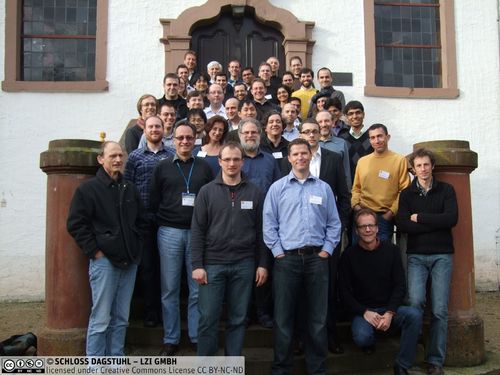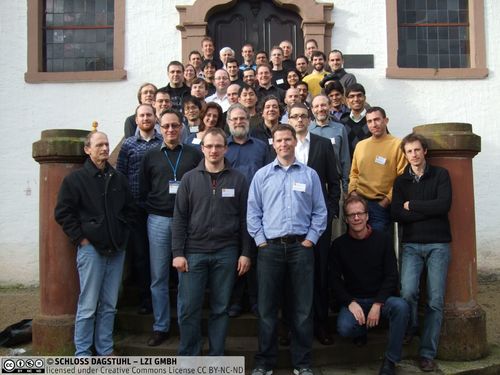Dagstuhl Seminar 12011
Foundations for Scripting Languages
( Jan 02 – Jan 06, 2012 )
Permalink
Organizers
- Robert Hirschfeld (Hasso-Plattner-Institut - Potsdam, DE)
- Shriram Krishnamurthi (Brown University - Providence, US)
- Erik Meijer (Microsoft Corporation - Redmond, US)
- Jan Vitek (Purdue University - West Lafayette, US)
Contact
- Annette Beyer (for administrative matters)
Common characteristics of scripting languages include syntactic simplicity, a lack of onerous constraints for program construction and deployment, the ability to easily connect to and control systems processes, strong built-in interfaces to useful external objects, extensive library support, and lightweight (and embeddable) implementations. More broadly, these characteristics add up to strong support for effective software prototyping. Due to a combination of these characteristics, common scripting languages like Perl, Python, Ruby, JavaScript, Visual Basic, and Tcl have moved from the fringes to mainstream program development.
To academics, these languages do not appear that different from, say, Scheme or ML. Since languages like Scheme and ML have well-defined semantics and other formal attributes, the mainstream passion for scripting languages may appear to simply be the result of ignorance of better languages amongst mainstream developers. However, the properties that scripting language users claim to find most beneficial are often not found in their more academic counterparts, such as a strong orientation towards systems process management, easily extensible objects, specific but useful control operators, etc.
In short, the academic tendency towards reductionism appears to miss some important characteristics. In particular, properties that may appear incidental---and are ignored by the formalization of academic languages---may actually be essential. As a result, the formal study of scripting languages is a worthwhile research activity in its own right.
Not only does the study of scripting offer academics fresh problems, their results have the potential for widespread benefit. As scripts grow into programs, the very characteristics that seem an advantage sometimes prove to be disadvantages. If any object can be extended by any other object, it is impossible to reason about its behavior. If any object can access any resources, it is impossible to bound security implications. If programmers can places values of any type into a variable, it is impossible to obtain type guarantees. And so on. In other words, the very flexibility that enables prototyping inhibits the reasoning necessary for programs to grow in scale.
As a result, the formal study of scripting languages is a worthwhile research activity in its own right. In particular, we hope this seminar had both direct and indirect impact on academia and industry. We also hope that, based on our discussions, academics will identify concrete problems that need solutions and find scripting language experts who they can communicate with. In turn, we hope scripting experts identified knowledge, expertise, and interest from academia and are better aware of how to formulate problems for academics and map their solutions back to practice.
- Amal Ahmed (Northeastern University - Boston, US) [dblp]
- Carl Friedrich Bolz-Tereich (Heinrich-Heine-Universität Düsseldorf, DE) [dblp]
- Ravi Chugh (University of California - San Diego, US) [dblp]
- William R. Cook (University of Texas - Austin, US) [dblp]
- Theo D'Hondt (Free University of Brussels, BE)
- Matthias Felleisen (Northeastern University - Boston, US) [dblp]
- Robert Bruce Findler (Northwestern University - Evanston, US) [dblp]
- Cormac Flanagan (University of California - Santa Cruz, US) [dblp]
- Matthew Flatt (University of Utah - Salt Lake City, US) [dblp]
- Jeffrey Foster (University of Maryland - College Park, US)
- Andreas Gal (MOZILLA - Mountain View, US)
- Philippa Gardner (Imperial College London, GB) [dblp]
- Kathryn E. Gray (University of Cambridge, GB) [dblp]
- Arjun Guha (Cornell University, US) [dblp]
- Stefan Hanenberg (Universität Duisburg-Essen, DE) [dblp]
- David Herman (MOZILLA - Mountain View, US) [dblp]
- Manuel Hermenegildo (IMDEA Software - Madrid, ES) [dblp]
- Michael Hicks (University of Maryland - College Park, US) [dblp]
- Robert Hirschfeld (Hasso-Plattner-Institut - Potsdam, DE) [dblp]
- Atsushi Igarashi (Kyoto University, JP) [dblp]
- Shriram Krishnamurthi (Brown University - Providence, US) [dblp]
- Ralf Lämmel (Universität Koblenz-Landau, DE) [dblp]
- Benjamin Lerner (University of Washington - Seattle, US) [dblp]
- Jens Lincke (Hasso-Plattner-Institut - Potsdam, DE)
- Hidehiko Masuhara (University of Tokyo, JP) [dblp]
- Mark S. Miller (Google Inc. - Mountain View, US)
- Floreal Morandat (Purdue University - West Lafayette, US)
- Oscar M. Nierstrasz (Universität Bern, CH) [dblp]
- Nathaniel Nystrom (University of Lugano, CH)
- Yoshiki Ohshima (Viepoints Research Institut - Glendale, US)
- Joseph Gibbs Politz (Brown University - Providence, US) [dblp]
- Gregor Richards (Purdue University - West Lafayette, US)
- Manuel Serrano (INRIA Sophia Antipolis - Méditerranée, FR) [dblp]
- Jeremy G. Siek (University of Colorado - Boulder, US) [dblp]
- Bastian Steinert (Hasso-Plattner-Institut - Potsdam, DE)
- Ankur Taly (Stanford University, US) [dblp]
- Éric Tanter (University of Chile - Santiago de Chile, CL) [dblp]
- Sam Tobin-Hochstadt (Northeastern University - Boston, US) [dblp]
- Laurence Tratt (King's College London, GB) [dblp]
- Herman Venter (Microsoft Corporation - Redmond, US)
- Jan Vitek (Purdue University - West Lafayette, US) [dblp]
- Philip Wadler (University of Edinburgh, GB) [dblp]
- Francesco Zappa Nardelli (INRIA - Le Chesnay, FR) [dblp]
Related Seminars
- Dagstuhl Seminar 14271: Scripting Languages and Frameworks: Analysis and Verification (2014-06-29 - 2014-07-04) (Details)
Classification
- Programming Languages / Compilers
- Semantics / Formal Methods
- Software Engineering
Keywords
- Programming languages semantics
- type systems
- verification techniques
- security analyses
- scalability
- rapid software development



